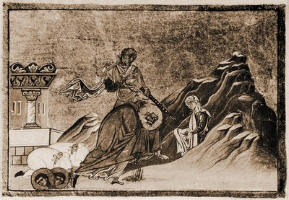
The Works Of Dionysius The Areopagite Volumes 1 & 2
SECTION VII
Now the multitude of the possessed indeed is unholy, but it is next above the catechumens, which is lowest. Nor is that which has received a certain participation in the most holy offices, but is yet entangled by contrary qualities, whether enchantments or terrors, on a par, as I think, with the altogether uninitiated and entirely uncommunicated in the Divine initiations; but, even for them, the view and participation in the holy mysteries is contracted, and very properly. For, if it be true that the altogether godly man, the worthy partaker of the Divine mysteries, the one carried to the very summit of the Divine likeness, to the best of his powers, in complete and most perfect deifications, does not even perform the things of the flesh, beyond the most necessary requirements of nature, and then as a parergon, but will be, at the same time, a temple, and a follower, according to his ability, of the supremely Divine Spirit, in the highest deification, implanting like in like;—such an one as this would never be possessed by opposing phantoms or fears, but will laugh them to scorn, and when they approach, will cast them down and put them to flight, and will act rather than comply, and in addition to the passionless and indomitableness of his own character, will be seen also a physician to others, for such “possessions” as these; (and I think further, yea, rather, I know certainly that the most impartial discrimination of Hierarchical persons knows more than they, that such as are possessed with a most detestable possession, by departing from the Godlike life, become of one mind and one condition with destructive demons, by turning themselves from things that really are, and undying possessions, and everlasting pleasures, for the sake of the most base and impassioned folly destructive to themselves; and by desiring and pursuing the earthly variableness, and the perishable and corrupting pleasures, and the unstable comfort in things foreign to their nature, not real but seeming;) these then, first, and more properly than those, were shut out by the discriminating authority of the Deacon; for it is not permitted to them to have part in any other holy function than the teaching of the Oracles, which is likely to turn them to better things. For, if the supermundane Service of the Divine Mysteries excludes those under penitence, and those who have already attained it, not permitting anything to come near which is not completely perfect, and proclaims, and this in all sincerity, that “I am unseen and uncommunicated by those who are in any respect imperfectly weak as regards the summit of the Divine Likeness” (for that altogether most pure voice scares away even those who cannot be associated with the worthy partakers of the most Divine mysteries); how much more, then, will the multitude of those who are under the sway of their passions be unhallowed and alien from every sight and participation in the holy mysteries. When, then, the uninitiated in the mysteries, and the imperfect, and with them the apostates from the religious life, and after them, those who through unmanliness are prone to the fears and fancies of contrary influences, as not reaching through the persistent and indomitable inclination towards godliness, the stability and activity of a Godlike condition; then, in addition to these, those who have separated indeed from the contrary life, but have not yet been cleansed from its imaginations by a godly and pure habit and love, and next, those who are not altogether uniform, and to use an expression of the Law, “entirely without spot and blemish,” when these have been excluded from the divine temple and the service which is too high for them, the all-holy ministers and loving contemplators of things all-holy, gazing reverently upon the most pure rite, sing in an universal Hymn of Praise the Author and Giver of all good, from Whom the saving mystic Rites were exhibited to us, which divinely work the sacred deification of those being initiated. Now this Hymn some indeed call a Hymn of Praise, others, the symbol of worship, but others, as I think, more divinely, a Hierarchical thanksgiving, as giving a summary of the holy gifts which come to us from God. For, it seems to me the record of all the works of God related to have been done for us in song, which, after it had benevolently fixed our being and life, and moulded the Divine likeness in ourselves to beautiful archetypes, and placed us in participation of a more Divine condition and elevation; but when it beheld the dearth of Divine gifts, which came upon us by our heedlessness, is declared to have called us back to our first condition, by goods restored, and by the complete assumption of what was ours, to have made good the most perfect impartation of His own, and thus to have given to us a participation in God and Divine things.

 Keep Site Running
Keep Site Running